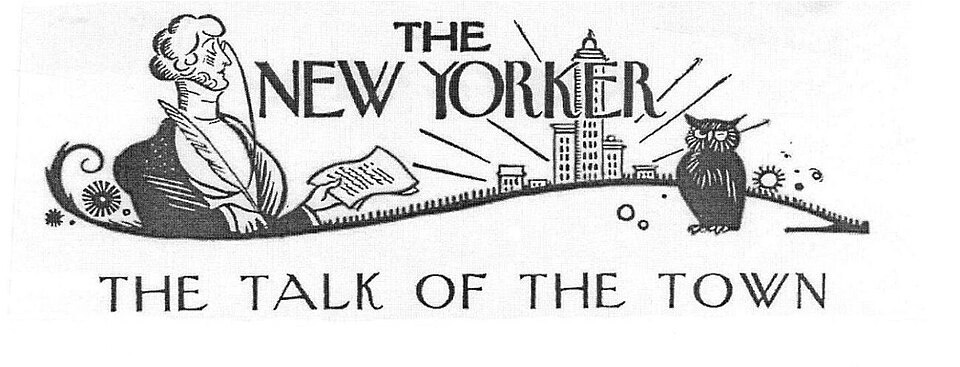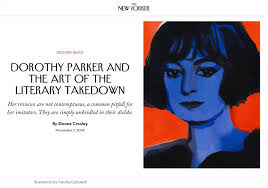Why I don't subscribe to The New Yorker
Tom Wolfe said the magazine was 'easier to praise than to read,' but it's become harder to praise, too

When did you realize that subscribing to The New Yorker was an investment in misplaced guilt? My moment came when—well into David Remnick’s long tenure as editor in chief—I saw the word “unputdownable” in a book review.
For years, I’d tried to believe in The New Yorker as a place that still prized wit, elegance, and iconoclasm in literary criticism. Or at least one where you could expect not to see lumbering jargon like “unputdownable.”
But at that moment I lost my faith the Church of The New Yorker, and I haven’t since tithed to its subscription department. Its commitment to the fierce originality of early book critics like Dorothy Parker and Edmund Wilson—or to the later refinement of those like John Updike—had collapsed. What I was seeing was another example of the hack writing that increasingly had infiltrated the magazine and that its editors had to have approved.
Among the New Yorker book critics, you could still count on the Pulitzer-winning Kathryn Schulz to show a bracing independence of thought. She’d tell you that the New York journalist Ted Conover had headed west to find out why people voted for Trump in 2016, only to punt in his book Cheap Land Colorado: “he makes his own time there seem like rural cosplay.”
But you never knew when Schulz, who also writes about science, would turn up in The New Yorker. If you renewed your print-and-digital subscription for $169 year, you might see her only a few times, maybe writing about something other than books. You’d resemble a whale that had to take in huge gulps of water to get a few small bits of food to digest.
Tom Wolfe had anticipated all of this. Or so I suspected when I read Tina Brown’s memoir The Vanity Fair Diaries: 1983-92.
Late in the book, Brown describes her reaction to learning that the Condé Nast chairman Si Newhouse wanted her to leave Vanity Fair and replace Robert Gottlieb as editor in chief of The New Yorker. She liked her job. But she thought that under Gottlieb The New Yorker had gone into multiple system failure. She recalled the incident recently in Fresh Hell, her Substack newsletter":
“What was the point of coming out weekly if you were running a piece on beekeeping the week that General Noriega was stealing the Panamanian election? I tended to agree with Tom Wolfe—that The New Yorker had become ‘easier to praise than to read.’ ”
Brown accepted Newhouse’s offer more than three decades ago, and if she added life to the book reviews as Gottlieb’s successor, it’s leached away under Remnick. The New Yorker remains easy to praise for its covers, its cartoons, and for its fearless reporting on certain topics, such as Patrick Radden Keefe’s searing evisceration of Purdue Pharma’s role in creating the opioid crisis, but harder for too much else.
Three awards for art and design, none for its writing
This month The New Yorker won three National Magazine Awards, one each for design, photography, and illustration. But it won none for its writing, whether fiction or nonfiction, and that may tell you something about Remnick’s current priorities.
All of this helps to explain why, when I want book reviews that haven’t lost their zing, I don’t turn to The New Yorker. I pick up my secondhand copy of Constant Reader (Viking, 1970), which collects 31 of Dorothy Parker’s New Yorker columns with the same title, published from 1927-1933. It includes her review of A.A.Milne’s The House at Pooh Corner, which has the most famous walk-off in American book reviewing: “Tonstant Weader Fwowed up.”

The Milne review also appears in Constant Reader: The New Yorker Columns: 1927-1928 (McNally Editions, 2024), which has a foreword by Sloane Crosley. That book has the advantages of a handsome cover, a fresher design, and its availability on Kindle.
But the foreword might had sharper insights had it come from a critic like Katha Pollitt or the late Joan Acocella instead of an essayist. And the book omits Parker’s nine post-1928 columns.
If you spring for the McNally edition, you won’t get Parker’s rave for Dashiell Hammett (“God help him, my hero"). You’ll also miss her review of Theodore Dreiser’s “latest museum piece,” Dawn, which has another well-known walk-off: “Theodore Dreiser / Should ought to write nicer.” I own both editions, which I hope will offer double protection if I’m tempted to review my subscription to The New Yorker.


I used to love the NY. Too ideological now.
The fiction pieces are remarkably awful with very few exceptions.